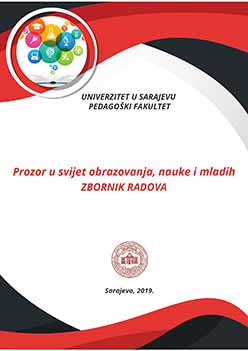VREDNOVANJE RADA UČENIKA U NASTAVNOM PROCESU
EVALUATION OF STUDENTS' ACHIEVEMENTS IN THE TEACHING PROCESS
Author(s): Amina Smajović
Subject(s): Educational Psychology, Pedagogy
Published by: UNIVERZITET U SARAJEVU – PEDAGOŠKI FAKULTET
Keywords: evaluation; assessment; didactic principles;
Summary/Abstract: Contemporary didactics pay great attention to the monitoring, evaluation and evaluation of students' knowledge. Evaluation is an integral part of everyday life and work. It is related to all aspects of man's existence, including the teaching process. The aim of this 686research was to examine the attitudes of students and teachers of primary school assessment, and to establish the representation of the principles of individualization, versatility and consistency in assessing students. The methodological framework includes descriptive and comparative methods. The results of the research show that students, according to school assessment, generally take neutral attitudes. On the other hand, teachers feel that the assessment method is satisfactory, they have enough knowledge and skills to adequately evaluate and evaluate students' knowledge and abilities. Consequently, a more positive attitude towards school evaluation is provided by class teachers. Students believe that the most common mistakes in the assessment are personal equation and contrast errors, while the least-perceived errors appear to have halo effects and adjust the quality criteria of the group. By analyzing the descriptive indicators and the response rate of the teacher to the points directly related to the representation and appreciation of the didactic principles, we can conclude that teachers consider that the principles of consistency, individualisation and versatility are adhered to when evaluating. The research of teachers 'attitudes has shown that classroom teachers are more consistent in evaluating students' knowledge and achievement in relation to subject teachers. On the other hand, subject teachers take more into account the principle of individualization compared to classroom teachers. Class teachers and subject teachers equally take into account the representation of the principle of versatility in the educational work. The conducted research shows that the evaluation is determined by numerous factors. One of the essentials is the formation of a positive attitude of the studenttoward the educational process. This will be enabled to the extent that the student receives positive feedback from the participants of the entire process. And feedback is nothing more than evaluating student's work, commitment, knowledge, abilities.
Book: Prozor u svijet obrazovanja, nauke i mladih
- Page Range: 685-700
- Page Count: 16
- Publication Year: 2019
- Language: Bosnian
- Content File-PDF

